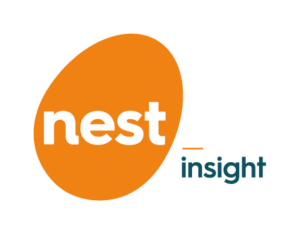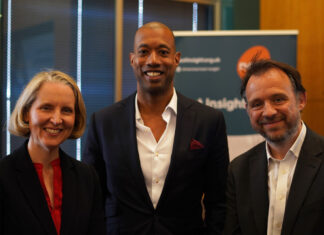Nest Insight has announced a significant new partnership with JPMorganChase to address the financial resilience of low-to-moderate income individuals in the UK. JPMorganChase will contribute more than £1.5m towards an 18-month project on building financial resilience, exploring new and better financial tools to support people on low and moderate incomes. This new project comes after the firm announced £40m in May in an expanded commitment to communities in the UK, including specific provision to help families build stronger financial futures, and highlighted the existing partnership with Nest Insight.
In the UK, more than 7 million low-income households went without essentials in the first half of 2023, and 4.5 million were in arrears. Over 2 million households were borrowing money to pay their bills[1]. The scale of high-cost lending in the UK was already significant before the start of the Covid pandemic, with 3 million consumers using high-cost credit on a regular basis[2]. And more than 3 million people may have borrowed from an illegal moneylender in the last three years[3].
Better financial resilience reduces money-related mental health issues, reducing sickness absence and avoidable accidents and increases productivity when in work. It reduces the kinds of hardship which can undermine educational attainment and feed through into lower earning capacity and hampered social mobility for future generations. Building household financial resilience has huge potential to support economic growth.
The goal of this vital exploration of financial resilience interventions is to enable access to financial resilience tools that work. Nest Insight will develop and trial new solutions for the millions of low- and moderate-income workers who lack financial resilience, building a robust evidence base around what works. The programme will engage with employers, policy-makers, the finance industry and frontline organisations working directly with consumers, advocating for and supporting system-wide change.
Today’s news is a further strengthening of a long-standing collaboration between the two organisations, who have worked together since 2017. Previously, JPMorganChase has supported major programmes of trials and research by Nest Insight:
- From 2017 to 2023, the Sidecar Savings programme trialled workplace emergency or ‘sidecar’ savings tools to support people in building up a savings buffer for emergencies alongside contributions into their pension. This work, also supported by the BlackRock Foundation and the Money and Pensions Service is recognised internationally as the first study of its kind undertaken anywhere in the world.
- In 2022 and 2023, exploratory research into workplace financial wellbeing tools scoped the potential role of Earned Wage Access and workplace loan models in supporting financial wellbeing.
Will Sandbrook, managing director of Nest Insight, said: “The need to build better financial resilience for people across the UK remains acute – and it’s an essential part of driving economic growth. People who have financial security today are more likely to save more for the future – and this in turn creates more investment in the broader economy. Since 2017, JPMorganChase has given significant support for Nest Insight’s work, enabling trials and research into new approaches – and resulting in real impact. This next phase demonstrates their meaningful commitment to financial wellbeing for UK households, in particular for those on lower incomes.”
Conor Hillery, Deputy CEO of EMEA and head of EMEA Investment Banking Coverage for JPMorganChase, said: “Earlier this year at a roundtable hosted by Nest Insight, we discussed how employers can create workplace solutions to improve the financial resilience of low-income people. Today, I’m pleased to announce our continued commitment to Nest Insight and a new £1.5 million investment. This funding will build on learnings from our past investment, and find improved financial tools to support people on low and moderate incomes. As a major employer in the UK, we have an important role to play in making investments that support our communities.”
Ian Cornelius, Interim CEO at Nest, said: “Nest set up Nest Insight in 2016 to look at low and moderate income households’ needs in the round, working with and challenging the financial services industry to keep lifelong financial security front and centre of its thinking. Nest Insight’s work has already been hugely influential in how we and others think about serving the needs of underserved and vulnerable populations to create financial peace of mind. We look forward to this work building on that crucial understanding. We’re very grateful to JPMorganChase for their collaboration and commitment to building household financial resilience.”
[1] Joseph Rowntree Foundation
[2] Financial Conduct Authority
[3] Responsible Finance
ENDS
About Nest Insight

Nest Insight is a public-benefit research and innovation centre. Our mission is to find ways to support people to be financially secure, both today and into retirement. We conduct rigorous, cutting-edge research, working collaboratively with industry and academic partners to understand the financial challenges facing low- and moderate-income households. We use these data-driven insights to identify and test practical, real-world solutions. Our findings are shared widely and freely so that people around the world can benefit from our work. For more information, visit nestinsight.org.uk
About JPMorganChase in the UK

With a legacy dating back more than 200 years, JPMorganChase has a track record of demonstrating leadership during times of both economic growth and financial instability. The firm employs approximately 22,000 employees throughout the U.K. and is committed to operating a healthy and vibrant company that plays a leading role in advancing a sustainable and inclusive economy.
The firm provides £474 billion in credit and capital to nearly 4,500 medium and large companies and supports over two million retail customers. At the same time, together with its non-profit partners the firm has supported over 33,000 low income households reduce their debt and improve their financial health, helped over 10,800 small businesses to grow their activity and placed over 9,000 individuals into apprenticeships or full and part-time employment.







